From Paperwork to Progress: Achieve More with Medical Dictation Software

Today, technology is everywhere, making our lives easier in so many ways. Machines build things for us, chatbots help out online, and some cars can even drive themselves. If you work in healthcare and want to use the latest tech to make your job easier, medical dictation software is something you should check out. The fact that for every hour doctors spend caring for patients, they’re stuck with 16 minutes of paperwork underscores just how valuable automating tools can be. Dictation medical software helps physicians quickly turn their words into text, making note-taking faster and paperwork less of a headache.
All the healthcare organizations we helped to develop healthcare software would tell you that any medical software improves productivity, especially those that assist in managing clinical documentation. Medical voice dictation software is one of the best tools in this regard. From voice recognition technology to integration capabilities and benefits, there are a lot of bases to cover. Additionally, using a unique identifier for each patient ensures that their information is accurately matched and securely stored.
from 25 countries outsourced software development to Relevant
We provide companies with senior tech talent and product development expertise to build world-class software.
So, we’ve created a guide that will highlight the key features of medical speech recognition tools and their impact on healthcare practice. Also, you’ll find here some of the top dictation apps to choose the right one for your needs.
What is Medical Dictation Software?
Medical dictation software uses automatic speech recognition technology to convert spoken words into written text. Unlike standard dictation software, medical versions are trained on a vast array of medical vocabulary and terminology, so they can accurately recognize even complex medical jargon and drug names.
Who uses medical dictation software? Doctors, nurses, therapists, and other healthcare workers all benefit from it. Such tools allow medical staff to accurately record a patient’s health information, such as their medical history, diagnosis, and treatment plan. The daily operations of a clinic are extremely fast-paced, dictating a patient’s information helps doctors and nurses save time, avoid mistakes, and recall any details that they might otherwise forget.
Key Features of Modern Medical Dictation Software
Dictation software for medical professionals comes in various forms. Some versions are built into tools you’re already familiar with, while others stand alone, packed with additional functionalities. Despite their differences in appearance and user experience, here’s a list of common features all medical dictation apps share.
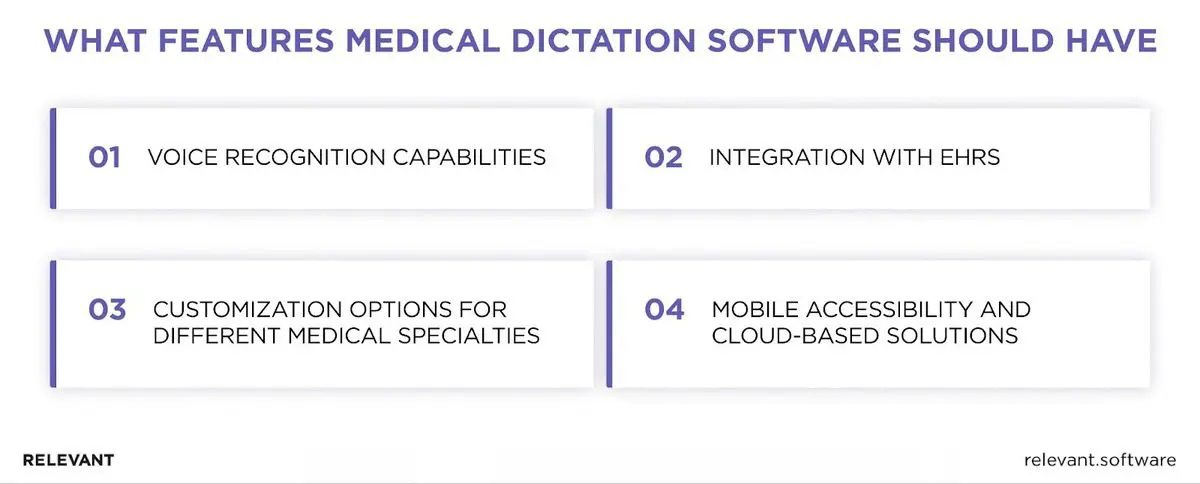
Voice Recognition Capabilities
At the heart of dictation software lies its ability to understand and transcribe your spoken words into written text. This key feature of medical voice recognition software is what sets it apart. Modern voice recognition engines are quick, precise, reliable, and easily adjustable to your unique way of speaking.
Imagine talking about a patient’s condition, and as you speak, your words are accurately captured as digital voice recordings and then transformed into text on your screen. The best medical voice recognition software can keep up with the fast-paced environment of the medical field, ensuring that no detail is missed and every record is as thorough and accurate as possible. What’s more, some advanced systems can handle audio-video inputs, allowing you to include multimedia elements in your documentation.
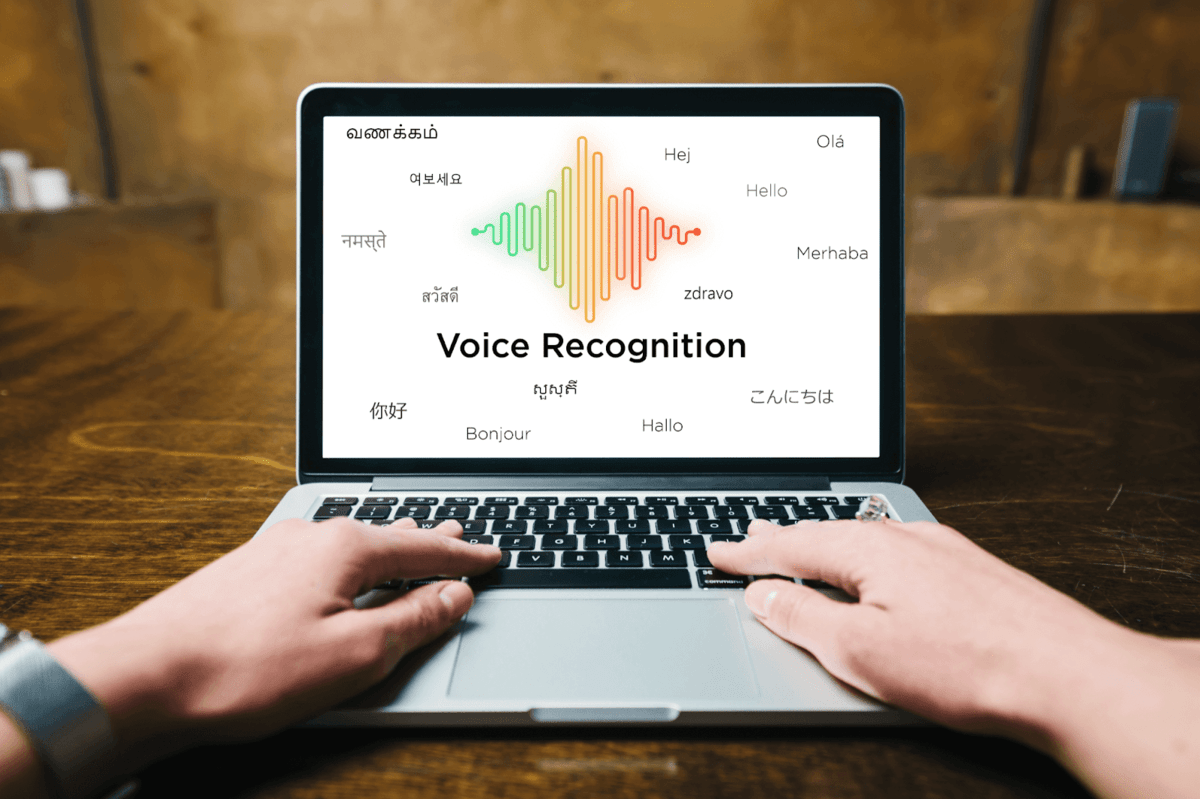
Integration with Electronic Health Records (EHRs)
A crucial feature of medical dictation software is to fit perfectly into your existing setup and work seamlessly with EHRs or any other clinical documentation tools you’re using. It’s a critical aspect to consider if you want to streamline clinical workflows and ensure that the transition from voice to text to patient record is as smooth and efficient as possible.
Good dictation software should integrate effortlessly with your EHR system to be a secure and straightforward addition to your toolkit. Installation, configuration, and daily use should be hassle-free, allowing you to focus more on patient care and less on technical issues.
Customization Options for Different Medical Specialties
Just as it’s important for the software to integrate smoothly with EHR systems, it’s equally crucial for it to be customizable to cater to the specific vocabulary, phrases, and documentation styles of various healthcare fields. Whether you’re in dermatology, cardiology, or any other specialty, the software should be versatile enough to match your particular requirements.
The right medical dictation software comes equipped with features that allow for easy customization. It should give you the option to tailor the software to recognize medical terms and phrases specific to your practice and specialty. Customization options also include templates and shortcuts for common report types specific to your specialty. Such a tool will better suit your workflow, which will ultimately save a lot of time and greatly enhance the quality of patient records.
Mobile Accessibility and Cloud-based Solutions
Accessing your medical transcription tools from anywhere at any time has become essential for healthcare professionals. Mobile-compatible and cloud-based medical speech-to-text software solutions allow you to effortlessly dictate patient information, take notes, and update records right from your smartphone or tablet.
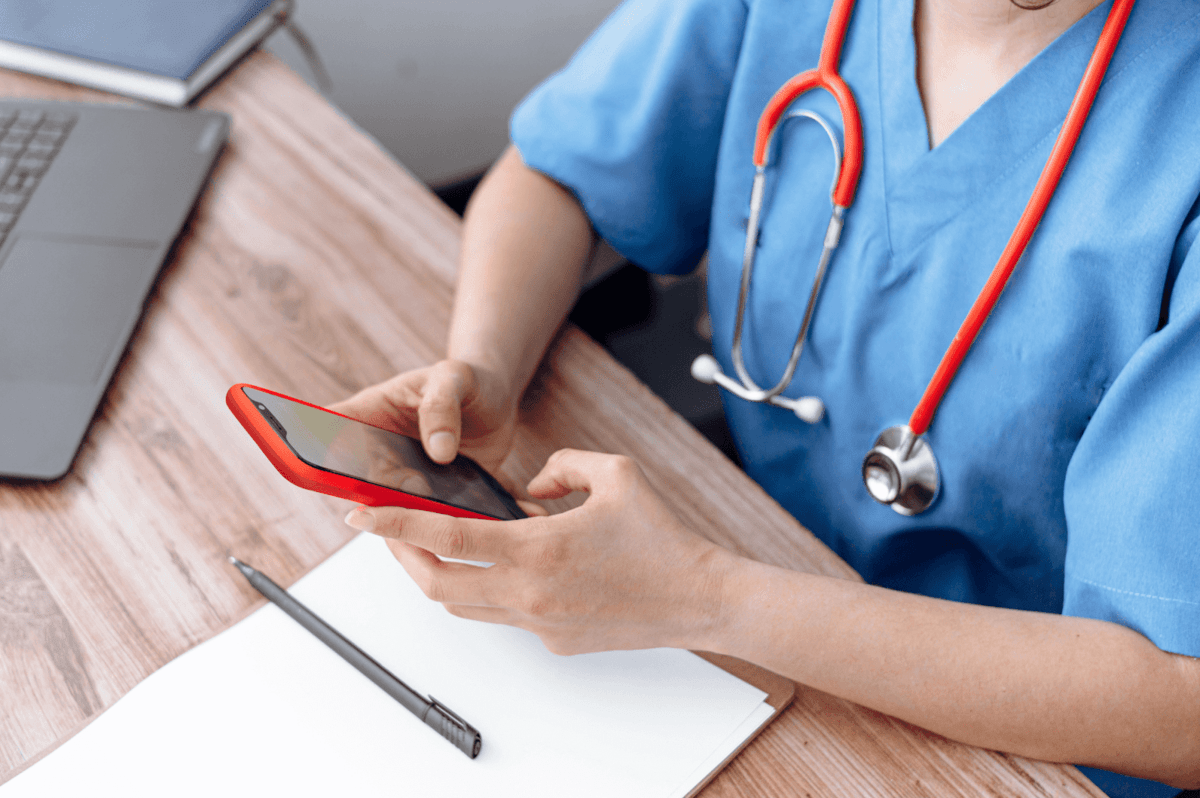
Real-Time Transcription and Editing
We believe that automated transcription and editing is one of the most convenient and time-saving digital solutions nowadays. As you speak, the speech recognition software records and transcribes your words instantly. This means you can dictate your clinical notes, findings, or diagnoses, and the software simultaneously displays the transcribed text on the screen.
The accuracy of these tools is thrilling. Thanks to machine learning and other AI technologies, transcription software understands medical jargon, different accents, and those moments when you speak at lightning speed because you’ve had one too many cups of coffee. Another noticeable feature is the ability to make changes to the transcribed text as soon as it appears. You can add, delete, or modify words or phrases on the fly. Shortly, that’s brilliant for always busy healthcare professionals who can save their precious time on making notes, typing, correcting, and formatting.
Security and Compliance
Patient data confidentiality and security are the key assets healthcare providers must protect first and foremost. With medical software for dictation, you can rest assured that your patients’ sensitive information is safeguarded with strong security measures. Since these tools are for medical use, they employ encryption protocols and adhere to the highest standards of data protection to ensure decent security. So, you can rest easy, knowing that every detail you dictate is locked away safely.
Likewise, medical dictation software should be compliant with industry regulations such as HIPAA (Health Insurance Portability and Accountability Act) in the United States and similar regulations in other countries. HIPAA-compliant tools automatically manage data access, audit trails, and user permissions so that your medical practice stays compliant without the usual stress. Fewer headaches over compliance issues for you and more time spent on caring for patients.
Support and Training
Software support and employee training are hardly the first things hospitals think about when they want to implement dictation tools. Yet, these often overlooked factors play a crucial role in the “health” of your software and whether you use it to its full potential.
After software adoption, you can face a glitch or seek advice on optimizing software performance, which requires specialized help. That’s why it pays to choose a medical dictation software provider that offers support services. They will help you solve any issues and hiccups quickly without disrupting your workflow.
Employee training is similarly vital for maximizing the investments and benefits of your new software. Top-tier software providers conduct live demonstrations, share hands-on practice, and carry out Q&A sessions to help your team understand the software’s features and functionalities faster. What’s more, training sessions often reveal those hidden gems of the software that make you wonder how you ever managed without them!
Benefits of Using Medical Dictation Software
Old-fashioned ways of creating medical records, like typing or writing notes by hand, are often slow and can be prone to errors. They also cut into the precious time that could be spent with patients or delivering care. This is the main reason why numerous healthcare professionals are now opting for medical dictation services. Here are the key benefits you can enjoy using software for taking notes:
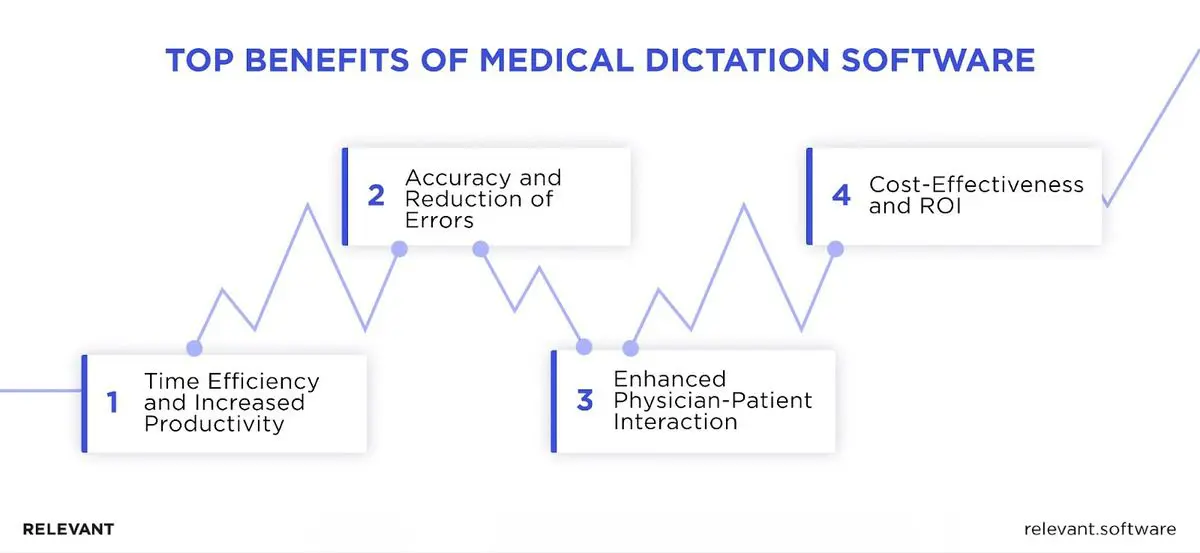
- Time Efficiency and Increased Productivity
In the healthcare industry, dealing with a heavy workload is common, with patients being referred constantly and schedules undergoing frequent changes and interruptions. In such an unpredictable environment, any chance to save time is warmly welcomed. Dictation medical software offers an excellent way for physicians to cut down on time. Simply put, dictating is much faster than typing. With this software in your toolkit, you don’t need to spend hours of typing.
- Accuracy and Reduction of Errors
Since the dictation process is guided by artificial intelligence, the software captures each word, term, and phrase, transcribing it in real-time. Thanks to dictation tools, critical medical information won’t be missed. At the same time, you will reduce the mistakes when it comes to grammar, spelling, punctuation, and terminology use. Consequently, the patient’s experience, including every symptom, is more precisely documented, aiding in a more accurate diagnosis.
- Enhanced Physician-Patient Interaction
Using a medical dictation app, doctors can quickly record what’s going on with patients, making sure nothing is missed. With accurately recorded patient’s health conditions, healthcare providers can better understand symptoms and provide the right treatment. Attention to detail will make patients feel heard and cared for, which helps strengthen the trust of patients.
Moreover, these digital files from the dictation app keep everyone in the loop. When patient info is easy to access and share, doctors can better collaborate and ensure that care continues smoothly from one visit to the next. More than just a way to save time on paperwork, dictation software helps doctors make sure every patient gets the attention they deserve.
- Cost-Effectiveness and ROI
When healthcare professionals dictate patient information directly into a digital recorder or use a medical speech recognition tool, the immediate benefit is the elimination of handwritten notes and the high expenses associated with outsourced transcription services. Plus, unlike other software that might strain a healthcare practice’s budget, the dictation app offers an affordable alternative for transcribing medical information.
Comparing Popular Medical Dictation Software Solutions
While PC-based dictation software often offers a broader range of features compared to their mobile app versions, the trade-off comes with the reduced portability of a desktop or laptop. Given the wide selection of medical dictation solutions available, we have curated a list of the best medical dictation software for both mobile devices and PCs.
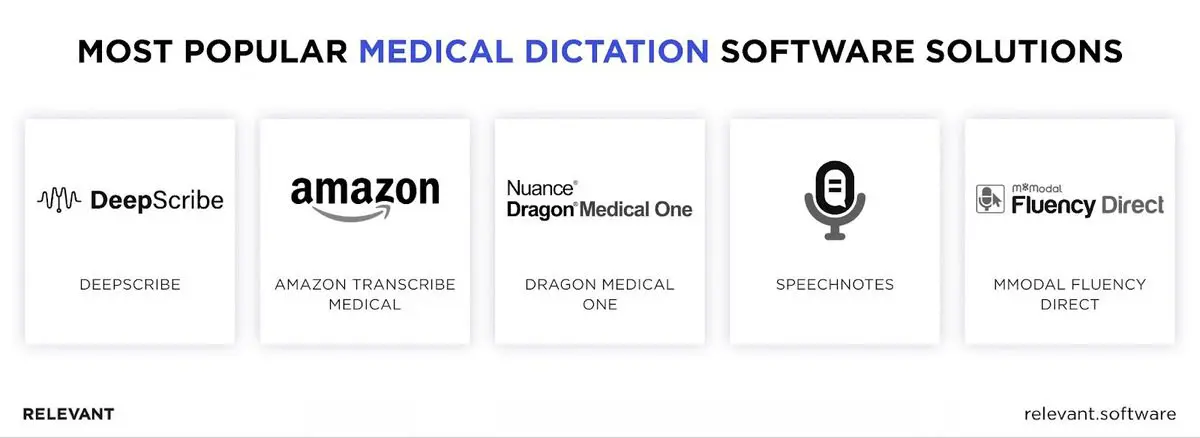
1. Amazon Transcribe Medical
Amazon Transcribe Medical is one of the top choices among healthcare professionals, packed with features that fit right into their daily tasks. It uses AI and machine learning to accurately pick up and transcribe medical terms (procedures, diagnoses, and medicines). The service incorporates strong security features to ensure patient information stays private and safe. It’s built to meet HIPAA standards and follow security protocols.
Key features:
- Advanced machine learning use: Capable of understanding and transcribing complex medical jargon.
- Easy to find records: Allows healthcare providers to easily retrieve historical records.
- Robust transcription and editing: Makes it simpler to keep patient details up to date.
Users generally praise Amazon Transcribe for its high accuracy, especially with common medical terms. However, some users mention the learning curve for navigating the AWS platform and high costs in terms of pricing as downsides.
Pricing: Amazon Transcribe Medical offers a pay-as-you-go model based on the number of minutes transcribed. This can be ideal for smaller practices or those with fluctuating transcription needs. However, for high-volume users, subscription models offered by competitors might be more cost-effective.
2. MModal Fluency Direct
MModal Fluency Direct is another cloud-based medical speech and dictation solution that uses natural language processing and machine learning to reduce the need for manual editing. It also offers custom templates and workflow management tools that help to improve productivity
Key features:
- Conversational workflow: Fluency Direct empowers you to dictate directly into your EHR using natural, conversational language.
- AI-powered accuracy: Like Transcribe Medical, Fluency Direct boasts deep learning capabilities to understand even the most intricate medical lingo.
- Custom templates and workflow management that will accelerate productivity
- Seamless Integration: Unlike Transcribe Medical’s AWS focus, Fluency Direct integrates seamlessly with various EHR platforms, allowing for a smooth and familiar experience within your existing workflow.
Generally, praise centers around Fluency Direct’s natural language recognition, intuitive interface, and tight integration with EHRs. Yet, lagging behind and slow operations are noticed by users as the main drawbacks.
Pricing: While cost structures can vary, Fluency Direct typically operates on a subscription model with various tiers, offering flexibility for different volume needs.
3. Dragon Medical One
Dragon Medical One has been the dominant medical dictation software for Windows in the world for the past decade. Just like Amazon Transcribe Medical, Dragon Medical One equips healthcare professionals with AI-powered tools to conquer documentation hurdles. But with its long-standing presence in the medical field and unique features, it carves its own niche.
Key features:
- Compatible with the majority of clinical systems: Seamlessly fits into any practice with ease
- Tailored to your workflow: Offers features like custom macros and templates. Streamline your documentation by letting you create personalized shortcuts that align with your specific practice and preferences
- Offline work: Unlike other cloud-based solutions, Dragon Medical One offers both cloud and offline modes.
Overall, users appreciate Dragon Medical One’s familiarity, customization options, and tight EHR integration. Yet, a few point out that its interface may not be as user-friendly as those of some newer competitors.
Pricing: there’s a 30-day free trial. For additional pricing details, you’ll have to reach out and request a quote.
4. DeepScribe
Healthcare professionals are really taking to DeepScribe medical dictation software because of its smart approach to medical dictation. It uses AI to automatically write down the speech, getting medical terms right with impressive accuracy. Plus, it works smoothly with any EHR, so updating patient files is effortless.
Key features:
- Effortless capture: Captures the entire patient encounter – your questions, patient responses, and your clinical observations. No need to toggle between dictation modes or miss crucial details.
- AI insights, human control: DeepScribe’s AI intelligently transcribes conversations, filtering out small talk and identifying key medical information. You then review and finalize the notes, ensuring accuracy and alignment with your clinical judgment.
- Seamless EHR integration: Integrates effortlessly with leading EHR platforms, allowing you to review and finalize notes directly within your existing workflow.
While DeepScribe is praised for its efficiency and the accuracy of its medical speech recognition, it requires potential users to consult with their team to discuss pricing options, as it does not offer a free trial.
Pricing: DeepScribe offers a variety of subscription plans based on usage needs and practice size.
5. Speechnotes
Speechnotes is an easy-to-use voice recognition tool that works with Google’s speech technology. The best thing about it is that you can install it as a Chrome extension. As a result, doctors have the convenience of dictating patient notes directly into their web-based EMR from their browser, making it a practical choice for medical dictation software for Mac users.
Key features:
- Browser-based simplicity: Runs entirely in your browser, offering accessibility from any device with an Internet connection.
- Start and pause shortcuts on the keyboard allow for easy control over dictation.
- Google Drive export enables seamless saving and sharing of documents
Users appreciate Speechnotes’ simplicity, accessibility, and free service. However, a notable drawback is its reliance on a stable Internet connection for optimal performance.
Pricing: Free
Here’s a comparison table to sum up key aspects of each medical transcription software and help you choose the best fit for your needs.
| Amazon Transcribe Medical | MModal Fluency Direct | Dragon Medical One | Deepscribe | Speechnotes | |
| Best for | High-volume users, budget-conscious practices | Customizable dictation app | Customizable dictation software | Effortless capture, ambient AI | Free web-based dictation software |
| Accuracy (estimated) | 85-90% | 85-95% | 85-95% | 75-85% | 75-85% |
| Pros | Pay-as-you-go, HIPAA compliant, real-time & batch processing | Strong accuracy, customizable, EHR integration | Familiar interface, extensive customization, offline work | Effortless capture, AI insights, EHR integration | Free, browser-based, simple |
| Cons | Limited customization, learning curve with AWS, complex medical terms | Subscription-based, limited Mac compatibility | Subscription-based, no native Mac app | Lower accuracy for specific jargon, | Limited features |
| Security & Compliance | HIPAA compliant | HIPAA compliant | HIPAA compliant | HIPAA compliant | HIPAA compliant |
| Integration | AWS services | Various EHR platforms | Various EHR platforms | Various EHR platforms | Google Drive |
| Pricing | Pay-as-you-go (minutes transcribed) | Subscription | Subscription | Subscription | Free |
Build Medical Dictation Software with Relevant
Healthcare is fast catching on to medical dictation software because it saves so much time while making physicians’ jobs easier and keeping patients satisfied. Thanks to AI and machine learning, creating and handling patient files is now simple, and it doesn’t cost much, either. Using dictation tools helps keep your practice up to speed with others, ensures bills are spot on, and makes patient care better. So, opting for medical dictation is a sure way to succeed in your practice.
There is an abundance of ready-to-use dictation tools out there, but they don’t always fit perfectly with every hospital’s unique needs. That’s why many hospitals turn to custom healthcare app development to build solutions that suit right into their specific workflows, where every feature aligns with how your teams work, making everything run smoother.
Relevant Software is a credible healthcare software development company with experience building HIPAA-compliant digital solutions of different complexities. We are a top player in healthcare development, and our clients are always satisfied with the quality of our work. If you are looking for IT specialists with expertise in healthcare to develop your medical dictation software, Relevant is your trustworthy partner.


Hand-selected developers to fit your needs at scale! Let’s build a first-class custom product together.

